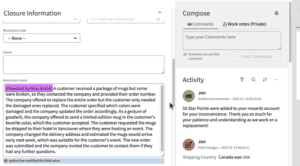In recent years, Artificial Intelligence (AI) has played an increasingly important role in several areas, driving innovation and automation. Among the different types of AI, generative AI stands out, a category that has been gaining prominence due to its ability to create new content autonomously. In this article, we will explore the different types of generative AI and their impact on integrating GenAI into ServiceNow platform.
What is the difference between generative AI and AI?
The main difference between generative AI and traditional AI lies in the way these systems learn and produce results. While traditional AI relies on pre-programmed algorithms and labeled data to perform specific tasks, such as pattern recognition or decision-making, generative AI uses deep learning models to autonomously generate new content.
While traditional AI is more data-driven and reactive, responding to specific inputs with predefined outputs, generative AI has the ability to create new data, such as text, images or videos, from an initial set of examples. This makes it especially useful in areas like creative content generation, machine translation, computer-aided design, and more.
What are the types of generative AI?
Text generation
One of the most common types of generative AI is text generation, where language models are trained on large sets of text data to generate new words, phrases, and even entire texts in a coherent and semantic way.
Image generation
Another important application of generative AI is image generation, where neural networks are trained on image datasets to create new realistic images that often appear to have been produced by humans.
Video and speech generation
In addition to text and image generation, generative AI can also be used to create synthetic videos and speech, enabling the automated production of personalized audiovisual content.
Data Augmentation
Finally, generative AI can be employed in data augmentation, generating additional examples to enrich training datasets and improve the performance of AI models on various tasks.
Integration of GenAI into ServiceNow
Integrating GenAI into the ServiceNow platform offers a number of benefits for organizations looking to increase their operational efficiency and automate repetitive processes.
Automation of Repetitive Tasks
GenAI can be used to automate a variety of repetitive tasks, such as triaging emails, categorizing support tickets, and routing requests, freeing up human resources for more strategic activities.
Customer Support and Problem Resolution

By integrating GenAI into ServiceNow's customer support system, companies can provide fast, accurate answers to frequently asked questions, automate common issues, and offer personalized assistance to users.
Prediction and Data Analysis
GenAI can be used to analyze large volumes of data and identify hidden patterns, trends, and insights that can help businesses make more informed decisions and predict future outcomes with greater accuracy.
Customization
With GenAI integration, companies can personalize the user experience by offering personalized recommendations, tailored content, and individualized support based on each user's preferences and interaction history.
Impact on Efficiency and Automation
Using GenAI in ServiceNow can have a significant impact on operational efficiency, user experience, innovation and risk management and company compliance.
Increased Operational Efficiency
By automating repetitive tasks and simplifying complex processes, GenAI can help companies reduce costs, optimize resources and increase the productivity of their teams.
Improved User Experience

By providing fast and accurate responses, personalizing interactions, and simplifying access to information, integrating GenAI into ServiceNow can significantly improve the user experience, increasing customer satisfaction and loyalty.
Accelerated Innovation

By automating operational tasks and freeing up resources for more creative and strategic activities, GenAI can drive innovation within organizations, enabling the development of new products, services and solutions more quickly and efficiently.
Risk Management and Compliance
By analyzing large volumes of data and identifying patterns of suspicious behavior or non-compliant activities, GenAI can help companies detect and mitigate risks while ensuring compliance with regulations and internal policies.
Conclusion
In short, generative AI offers an innovative approach to content creation and problem solving, enabling companies to generate new insights, automate processes, and improve the user experience.
The introduction of GenAI into ServiceNow is set to transform IT and business operations by delivering unprecedented levels of automation, efficiency and customization. As companies seek to adapt to these changes, it is crucial that they also consider the ethical and privacy implications associated with the advanced use of AI technologies. However, with careful implementation and proper governance, GenAI in ServiceNow has the potential to significantly drive business performance and innovation.
Historic
Since its founding, the field of machine learning has used statistical models, including generative models, to model and predict data. Starting in the late 2000s, the emergence of deep learning has driven progress and research in image and video processing, text analysis, speech recognition, and other tasks. However, most deep neural networks have been trained as discriminative models that perform classification tasks such as image classification based on convolutional neural networks.
In 2014, advances such as the variational autoencoder and the generative adversarial network produced the first practical deep neural networks capable of learning generative, rather than discriminative, models from complex data such as images. These deep generative models were the first capable of generating not only class labels for images, but also entire images.
In 2017, the Transformer network enabled advances in generative models, leading to the first pre-trained generative transformer in 2018.20 This was followed in 2019 by GPT-2, which demonstrated the ability to generalize unsupervised to many different tasks as a foundational model.
In 2021, the launch of DALL-E, a transformer-based generative pixel model, followed by Midjourney and Stable Diffusion marked the emergence of the practical art of high-quality AI from natural language cues.
In January 2023, Futurism.com broke the story that CNET was using an undisclosed internal AI tool to write at least 77 of its stories; After the news broke, CNET published corrections to 41 of the stories.
In March 2023, the GPT-4. A team at Microsoft Research argued that it “could reasonably be seen as an early (but still incomplete) version of a strong artificial intelligence (FAI) system.”
In April 2023, German tabloid Die Aktuelle published a fake AI-generated interview with reclusive former racing driver Michael Schumacher. The story included two possible revelations: the cover included the phrase “deceptively real” and inside the magazine acknowledged at the end of the interview that the interview was generated by AI. The editor-in-chief was fired soon after amid the controversy.
